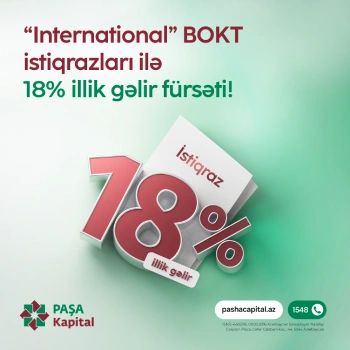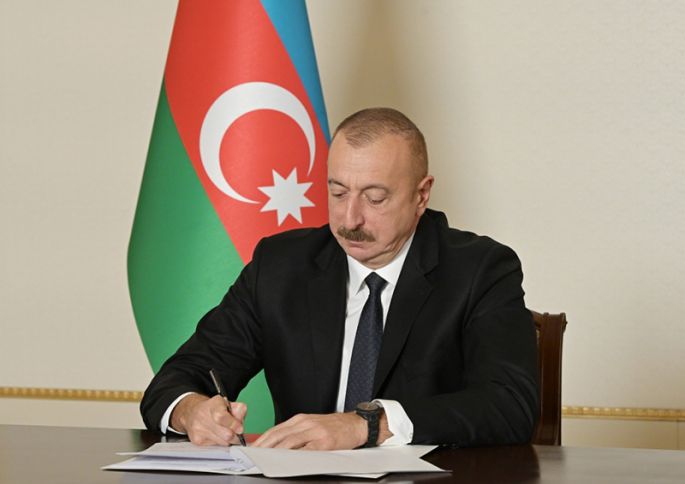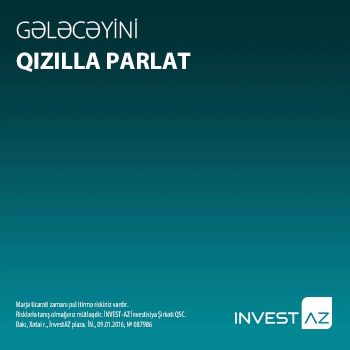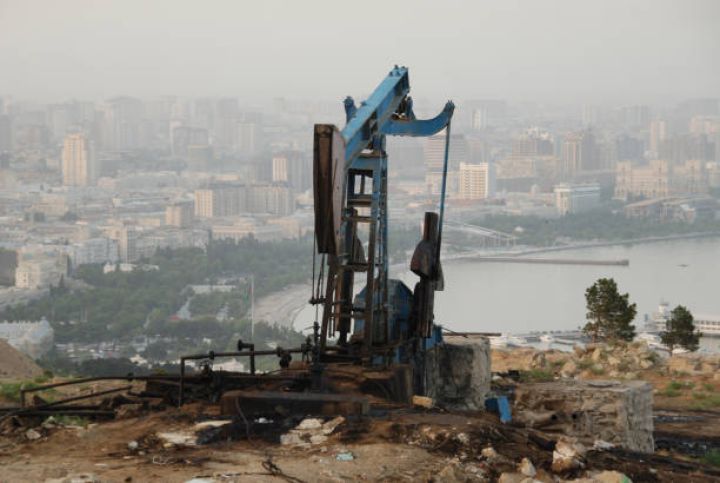"Moody's": Azərbaycanın "neqativ" proqnozlu reytinqi riskləri əks etdirir

"Moody's" beynəlxalq reytinq agentliyi Azərbaycanın "neqativ" proqnozlu "Ba1" dərəcəli kredit reytinqini təhlil edərək bildirib ki, bu, ölkənin iqtisadi artımı üçün yaranan riskləri əks etdirir.
Bu barədə "Moody's" beynəlxalq reytinq agentliyinin Azərbaycanın krediut reytinqi ilə bağlı illik təhlil hesabatında bildirilib.
Sənəddə, həmçinin qeyd olunub ki, iqtisadi artım üçün yaranan risklərin səbəbi isə milli valyuta - manatın məzənnəsinin düşməsi, alıcılıq qabiliyyətini aşağı salan yüksək inflyasiya, ev təsərrüfatlarının azalan istehlakı və bank sektorunun zəif vəziyyəti ilə əlaqədar investisiya perspektivlərinin azalması ilə bağlıdır.
Bununla yanaşı, agentlik bildirir ki, dövlət büdcəsinə kifayət qədər gəlir gətirən karbohidrogen ehtiyatlarının olması reytinqə müsbət təsir edir. Bundan başqa, ekspertlərin sözlərinə görə, dövlət borcu artsa da, aşağı həddə qorunub.
"Müsbət tərəflərdən biri də Azərbaycan Dövlət Neft Fondunun iri həcmdə ehtiyatlara sahib olmasıdır ki, bu vəsaitlər daxili və xarici şokların qarşısını almağa yardım edir", - deyə məlumatda bildirilir.
"Moody`s"in proqnozuna əsasən, cari ötən il 1,1% artan Azərbaycan iqtisadiyyatı cari ildə 3,3%-lik azalma ilə üzləşəcək. Buna səbəb ixracın və investisiyaların həcminin azalmasıdır. Bununla yanaşı, "Moody 's" gələn il Azərbaycan ümumdaxili məhsul istehsalının (ÜDM) 1,1% artacağını proqnozlaşdırır.
Agentliyin ekspertləri onu da qeyd edir ki, 2018-ci ildə ölkəmizin iqtisadiyyatı 1,9% genişlənəcək: "2018-ci ildə karbohidrogenlərin qiymətinin artması, kreditləşmənin artması və "Şahdəniz-2" layihəsində hasilatın artması dövlət büdcəsinə daxilolmaları artıracaq".
"2016-cı il üzrə dövlət büdcəsinin təhlili onu göstərir ki, Azərbaycan hökuməti fiskal konsolidasiyaya sadiqdir", - deyə agentliyin ekspertləri qeyd edib.
Moody's: Azerbaijan faces challenges, but fiscal strength is high
Moody's Investors Service says that the negative outlook for Azerbaijan's Ba1 rating reflects various prevailing risks to economic growth, due to the adverse effects from the depreciation of the manat and high inflation on households' purchasing power and consumption, and the weak state of the banking sector, which dampens the outlook for investment.
Moody's conclusions are contained in its just-released annual credit analysis on the Government of Azerbaijan. The report elaborates on Azerbaijan's credit profile in terms of Economic Strength, Low (+); Institutional Strength, Low (-); Fiscal Strength, High; and Susceptibility to Event Risk, Moderate (+); These are the four main analytic factors in Moody's Sovereign Bond Rating Methodology.
The Ba1 rating is supported by a number of credit strengths, including (1) sizeable hydrocarbon reserves, which provide substantial revenue to the government; (2) low (though rising) government debt and low interest payments; and (3) large foreign reserves, held in a sovereign wealth fund, which cushion against internal and external shocks.
Meanwhile, factors constraining the rating include (1) a low level of economic diversification; (2) a weak banking sector; (3) weak institutions; and (4) geopolitical tensions.
As the oil price declined from mid-2014 to early-2016, Azerbaijan's weak absorption capacity to external shocks became evident, reflected in our assessment of Economic Strength.
Growth fell to 1.1% in 2015 and is forecasted at -3.3% in 2016, as nominal exports fell and public investment was cut. Moody's forecasts growth of 1.1% in 2017 and 1.9% in 2018, as hydrocarbon prices increase, credit growth resumes, and increased gas production from the second stage
of the Shah Deniz gasfield comes on stream. Higher than expected inflation in 2017 is a downside risk to the 2017 forecast.
Despite progress in recent years, Institutional Strength is Low (-) and, despite some signs of improvement, Azerbaijan still compares poorly with its credit-rating peers. The Ba-median country is ranked much higher than Azerbaijan on the Rule of Law and Control of Corruption Worldwide
Governance Indicators that Moody's uses as a proxy for institutional strength. Moreover, some important macro-economic data are not publicly available, hampering the transparency and effectiveness of policymaking.
By contrast, Moody's assessment of fiscal strength is High. Although Azerbaijan's public finances are highly sensitive to fluctuations in oil prices, manageable levels of government debt, sizable reserve buffers and high debt affordability provide ample fiscal space. Azerbaijan's modified
2016 budget demonstrates the authorities' strong commitment to fiscal consolidation.
We asses Azerbaijan's geopolitical risks as "Moderate (+)", considering persistent tensions with neighboring Armenia (B1 stable) over the disputed territory of Nagorno-Karabakh.
Other potential event risks are lower. In particular, Government Liquidity Risk is Low, supported by low public debt and stable foreign assets. Banking sector risk is Low (-), mitigated by the sector's small size and the government's sizable assets, although the outlook for the Azeri banking system remains negative, as banks confront mounting challenges stemming from recession, sharp currency depreciation, and high interest rates.
Mənbə: Moody's, Report, APA
Müştərilərin xəbərləri
SON XƏBƏRLƏR
- 4 həftə sonra
-
3 həftə sonra
“Coca-Cola” tələbələr üçün “One Idea” innovasiya müsabiqəsinə start verdi
- 10 saat əvvəl
-

- 10 saat əvvəl
- 10 saat əvvəl
- 10 saat əvvəl
- 10 saat əvvəl
-
12 saat əvvəl
Mərkəzi Bankı fişinq hallarına qarşı yeni sistem tətbiq edəcək
-
12 saat əvvəl
24 400 manat ilkin ödəniş et, Biləcəridə tam təmirli, 3 otaq studiya sənin olsun - “Kristal!”
-
13 saat əvvəl
Səudiyyə Ərəbistanın neft şirkətinin obyekti vurulub, fəaliyyətini dayandırıb
- 13 saat əvvəl
-
14 saat əvvəl
Adları “Qızıl kitab”a yazılmış gənc istedadlara xüsusi təqaüdlər veriləcək - 62 MİN MANAT AYRILDI
Son Xəbərlər

Azərbaycanda Vakansiyalar - Azvak.az

"İran Trampı öldürməyə çalışır"
.webp)
İnvestisiya şirkətlərinin dövriyyələri açıqlandı

Bakı Fond Birjasının ticarət dövriyyəsi kəskin azalıb

Mərkəzi Bankı fişinq hallarına qarşı yeni sistem tətbiq edəcək

24 400 manat ilkin ödəniş et, Biləcəridə tam təmirli, 3 otaq studiya sənin olsun - “Kristal!”
Ən çox oxunanlar

“Yaşıl Cümə” başlayır – hər yer yaşıl olacaq!

Adları “Qızıl kitab”a yazılmış gənc istedadlara xüsusi təqaüdlər veriləcək - 62 MİN MANAT AYRILDI

PAŞA Sığorta 20 illiyini “Yubiley” kampaniyası ilə qeyd edir!

İran neftin qiymətinin 200 dollara qədər yüksələcəyini ehtimal edir



























